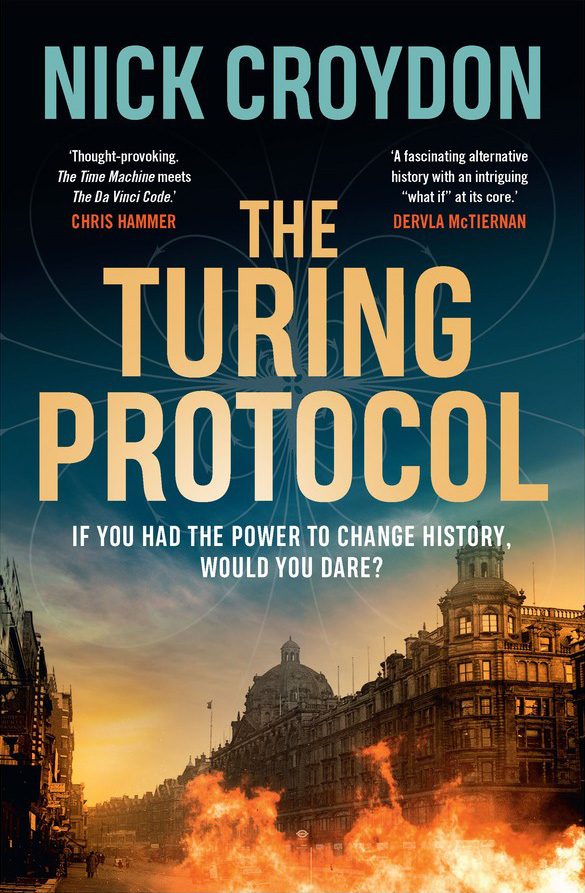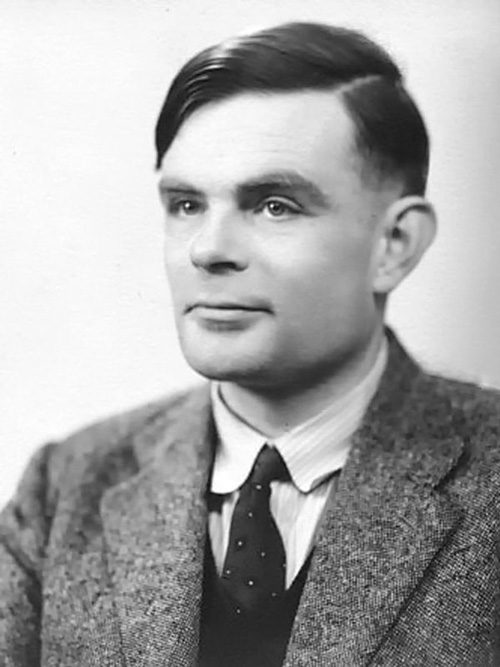A new novel about persecuted gay codebreaker Alan Turing has drawn backlash for allegedly “straight-washing” his life, prompting a book review website to restrict reviews of the title over “unusual behaviour” – but the author insists the criticism is misplaced.
The Turing Protocol, the debut novel of Australian Nick Croydon, chief executive of QBD Books, reimagines Turing’s life in an alternate history of World War II.

In the book, Turing invents a machine called the Nautilus, capable of sending messages back into the recent past. He uses it to alter the course of the war, aiding the Allied forces, and later entrusts it to Joan, the mother of his secret child.
“Over the next seventy years, the Nautilus is passed down through the Turing family, who all must decide for themselves when to use this powerful invention,” its blurb says.
Backlash against The Turing Protocol
The controversy stems from the novel’s depiction of Turing in a sexual relationship with a woman — despite his persecution and chemical castration for being gay.
On social network and book review website Goodreads, many readers condemned the portrayal as erasure, handing out one-star reviews. Of 115 ratings, about 64 per cent gave one star and 21 per cent gave five stars. There are 49 written reviews.

“Historical fiction is a thing, I can acknowledge that it exists and has a valid place in the world of stories,” wrote Annie Social. “HOWEVER, Nick has taken the story of someone who was only pardoned in 2013 for his ‘crime’ of being homosexual and spun it for his own mediocre story.
“There are many gay people I know who don’t even know who Alan is. If there are people reading this who don’t know them, a major disservice has been done to his memory. He deserves a lot better than this.”
Jess, another reviewer, wrote: “The portrayal of his relationship and especially the sex scenes in the book are quite disturbing. Not only is writing a sex scene involving a real person who actually existed quite strange and weird, portraying Turing as so heterosexual is literally an attack on his memory.”
Another, Steven Bennett, said: “Honestly one of the worst things I’ve ever read, do not waste your time or money on it.”
Some readers, however, praised the work.

Anabela described it as “an intelligent and thought-provoking read that had me thinking long after the final chapter… Thanks to the team at @affirmpress for this gifted copy.”
Natasha Ritz said: “Really enjoyed this read, it was a great step into historical fiction as a fantasy reader.”
Reviews restricted
Reviews have since been restricted.
In a note on its website, Goodreads states: “This book has temporary limitations on submitting ratings and reviews. This may be because we’ve detected unusual behaviour that doesn’t follow our review guidelines.”
That didn’t stop readers finding other means to leave reviews, including on Google, where Grace Huo wrote: “On top of having absolutely atrocious writing, the book straight washes a historical figure who was famously chemically castrated for being gay.”
The book was also promoted as QBD’s “Book of the Month” – a decision that itself drew criticism.
“It’s going to be hard to trust further QBD recommendations after learning the CEO is clearly pushing his own book on to the staff,” wrote Sophia Clarke.
Author, QBD Books reject criticisms
Croydon rejected accusations of straight-washing. “At no time did I say Turing wasn’t gay,” he told The Australian newspaper. “The book makes it very plain that he is gay.
“It talks about how he had to hide the fact that he was gay, and in the historical note page at the back of the book I again acknowledge the travesty of the treatment he received.”
A QBD Books spokesperson told Gay Sydney News the “Book of the Month” program followed “a rigorous selection process that highlights debut or new authors who have written standout works”.
The spokesperson also pointed to the author’s note. “Throughout the novel, Alan Turing’s identity as a gay man is neither erased, questioned nor diminished,” they said. “Specifically, the author’s note at the end of the book reads ‘The way he was treated by society and the authorities was a travesty’.”
They added that speculative historical fiction often explored “lavender marriages” – arrangements in which LGBTQ+ individuals married opposite-sex partners due to societal pressures.
“These marriages have resulted in children and enduring bonds, not as a means of ‘covering up’ queerness, but as strategies for survival, often founded on empathy,” the spokesperson said.
Eliot Hastie is a senior news producer at Channel Ten, reporting on a range of general stories, specialising in foreign affairs and LGBTQ+ stories. He’s also a reporter for Gay Sydney News, where he covers LGBTQIA+ culture, politics and nightlife. He previously helped to build and launch ausbiz, Australia's only live streaming finance news channel, where he was also an executive producer and host. He has previously worked as a finance and business journalist for publications including Fintech Business, Real Estate Business and other Momentum Media titles. Eliot holds a journalism degree from the University of Westminster and brings experience in both broadcast and digital reporting. Contact Eliot: eliot.hastie@gaysydneynews.com.au



